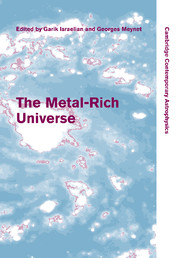Book contents
- Frontmatter
- Contents
- List of contributors
- Preface
- Part I Abundances in the Galaxy: field stars
- Part II Abundances in the Galaxy: Galactic stars in clusters, bulges and the centre
- Part III Observations – abundances in extragalactic contexts
- Part IV Stellar populations and mass functions
- 24 The stellar initial mass function of metal-rich populations
- 25 Initial-mass-function effects on the metallicity and colour evolution of disc galaxies
- 26 The metallicity of circumnuclear star-forming regions
- 27 The stellar population of bulges
- 28 The metallicity distribution of the stars in elliptical galaxies
- 29 Wolf–Rayet populations at high metallicity
- 30 The stellar populations of metal-rich starburst galaxies: the frequency of Wolf–Rayet stars
- Part V Physical processes at high metallicity
- Part VI Formation and evolution of metal-rich stars and stellar yields
- Part VII Chemical and photometric evolution beyond Solar metallicity
24 - The stellar initial mass function of metal-rich populations
Published online by Cambridge University Press: 02 December 2009
- Frontmatter
- Contents
- List of contributors
- Preface
- Part I Abundances in the Galaxy: field stars
- Part II Abundances in the Galaxy: Galactic stars in clusters, bulges and the centre
- Part III Observations – abundances in extragalactic contexts
- Part IV Stellar populations and mass functions
- 24 The stellar initial mass function of metal-rich populations
- 25 Initial-mass-function effects on the metallicity and colour evolution of disc galaxies
- 26 The metallicity of circumnuclear star-forming regions
- 27 The stellar population of bulges
- 28 The metallicity distribution of the stars in elliptical galaxies
- 29 Wolf–Rayet populations at high metallicity
- 30 The stellar populations of metal-rich starburst galaxies: the frequency of Wolf–Rayet stars
- Part V Physical processes at high metallicity
- Part VI Formation and evolution of metal-rich stars and stellar yields
- Part VII Chemical and photometric evolution beyond Solar metallicity
Summary
Does the initial mass function (IMF) vary? Is it significantly different in metal-rich environments versus metal-poor ones? Theoretical work predicts this to be the case, but in order to provide robust empirical evidence for this, the researcher must understand all possible biases affecting the derivation of the stellar mass function. Apart from the very difficult observational challenges, this turns out to be highly non-trivial, relying on an exact understanding of how stars evolve, how stellar populations in galaxies are assembled dynamically and how individual star clusters and associations evolve. N-body modelling is therefore an unavoidable tool in this game: the case can be made that without complete dynamical modelling of star clusters and associations any statements about the variation of the IMF with physical conditions are most probably wrong. The calculations that do exist demonstrate time and again that the IMF is invariant: there exists no statistically meaningful evidence for a variation of the IMF on going from metal-poor to metal-rich populations. This means that currently existing star-formation theory fails to describe the stellar outcome. Indirect evidence, based on chemical-evolution calculations, however, indicates that the extreme starbursts that assembled bulges and elliptical galaxies may have had a top-heavy IMF.
- Type
- Chapter
- Information
- The Metal-Rich Universe , pp. 227 - 248Publisher: Cambridge University PressPrint publication year: 2008
- 2
- Cited by



